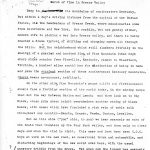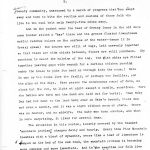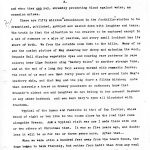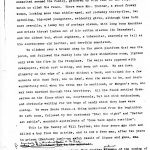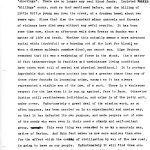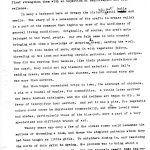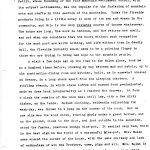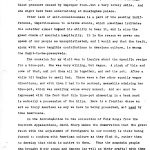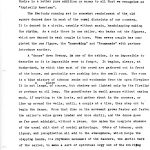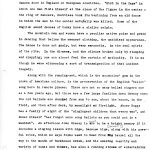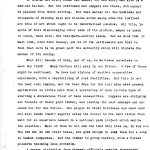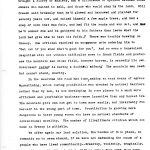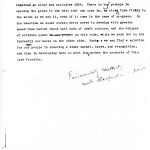Pine Mountain Settlement School
Series 09: Biography
ALICE COBB STORIES March of Time in Greasy Valley, 1936
TAGS: Alice Cobb Stories; Alice Cobb; Greasy Creek; Pine Mountain Settlement School; mining camps; log houses; puncheon floors; Will Trotter family; Lige Jackson; blue-pot dyes; weaving; vegetable dyes; mountain arts and crafts; fireside products; Nolan family; Kentucky Running Set; mountain men and women; English “ballet” singing; Abner Boggs family;
Alice Cobb, staff worker, teacher, fund-raiser, and Sunday School missionary was at Pine Mountain Settlement School from 1932 until 1937. She returned to do promotional work in the early 1940s for two years and thereafter was a constant visitor to the campus and the area. Never short of an opinion, she pushed hard for change in people and place but also pulled tradition lovingly to the foreground of her writing. She was a contrarian in every sense — both loving and hating the life she saw around her. But, her ability to capture the moment with an easy and eloquent writing style has yielded one of the most personal and engaging portraits of the region.
The area still struggles with the hope she expressed in this essay:
“There is hope perhaps in opening the gates to the best that can come in, and closing them firmly to the worst as we see it, even if it comes in the name of progress.”
[** The editors can find no evidence that this essay has appeared in other publications, but it is possible this is the case, as the style appears to be one signaling formal publication. We would appreciate notification of any duplication.]
GALLERY: ALICE COBB STORIES March of Time in Greasy Valley, 1936
- cobb_march_time_001
- cobb_march_time_002
- cobb_march_time_003
- cobb_march_time_004
- cobb_march_time_005
- cobb_march_time_006
- cobb_march_time_007
- cobb_march_time_008
- cobb_march_time_009
- cobb_march_time_010
- cobb_march_time_011
- cobb_march_time_012
- cobb_march_time_013
TRANSCRIPTION: ALICE COBB STORIES March of Time in Greasy Valley, 1936
[Transcribed from typewritten pages that had been edited with handwritten notations. The text below has been slightly edited for clarity. The headings in brackets are those of the editors.]
Page 1 – [cobb_march_time_001.jpg]
[The Missionary Lament]
Deep in the mountains of southeastern Kentucky, but within a day’s driving distance from the capital of the United States, lie the headwaters of Greasy creek, where missionaries come from California and New York. Not rapidly, but not gently either, modern life is picking a way into Greasy valley, and there is being enacted a drama typical of shifting and changing mores all through the hills. But the neighborhood which still slumbers fitfully in the shelter of a gnarled and knotted fist of Pine Mountain (that high sharp ridge running from Pineville, Kentucky, almost to Bluefield, Virginia, a hundred miles south) has the distinction of being in name and game the sorriest section of these southernmost Kentucky mountains. (Sorry means no-account, trifling).
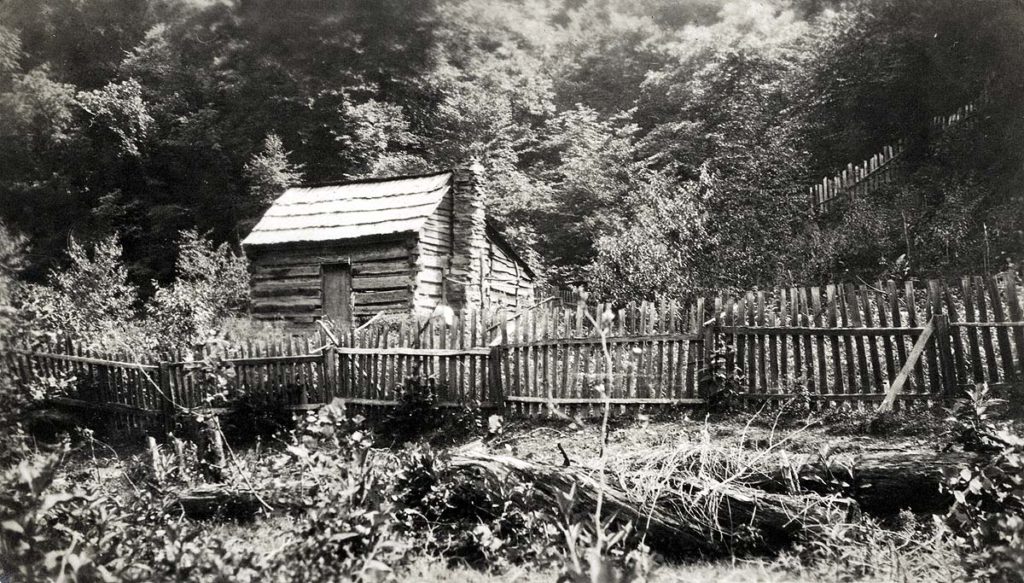
“A Windowless Cabin on the Shores of Greasy, June 20,,” 1923. BC_3564 Kathrine True Album, modified.
On the other side, Pine Mountain’s gaunt cliffs and fire-blackened stumps face a frothing section of the world today, in the mining camps that dot the way between Harlan and Lynch; and they look on to Big Black, whose grim sheer height overshadows another string of black beads, with names which have furnished a rich vein of table talk throughout our country – Evarts, Draper, Verda, Coxton, Lewallen.
But on this side (“yon” side, to you) we hear scarcely an echo of the train that thunders up the Poor Fork valley, and then only on clear days and when the wind is right. This year and last have seen C. C. C. boys at work on the new road, an occasional truck and automobile, and disturbing beginnings of the new world over here, with the usual unsavory dribble from the dregs. Yet even now the inroad has scarcely scratched the surface, and until two years ago this corner lay like a…
Page 2 – [cobb_march_time_002.jpg]
2.
A sleeping beauty community, unaroused by a march of progress that “has swept away and torn to bits the routine and customs of those folk who live in the coal belt only twenty-five miles away.”
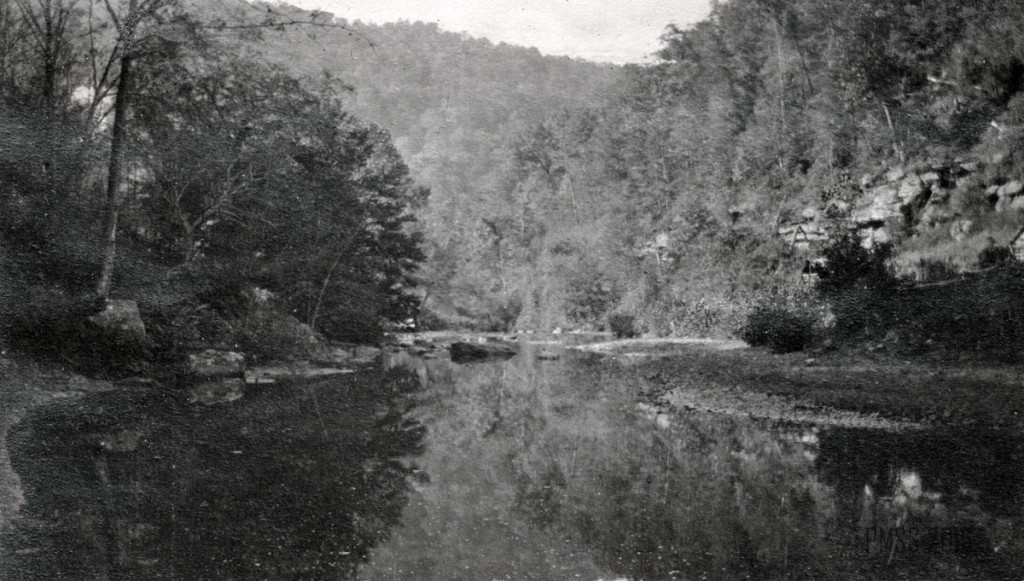
034b P. Roettinger Album. “Greasy. [Creek surrounded by mountain on all sides.
And in the pocket near the head of Greasy (once in the old days some hunter killed a “bar” there and the grease floated downstream making rainbow colors on the surface of the water — hence it is Greasy creek) the houses are still of logs, laid unevenly together so that there are wide chinks between, floors are still puncheon. (By puncheon is meant the halving of the log. The flat sides are fitted together leaving gaps wide enough for a curious chicken passing under the house to poke its head up through into the room.) Here in one or two rooms live the family, or perhaps two families, and the pigs or the dogs. Here passes the monotonous round of days, no clock but the sun, no light at night except a candle, sometimes. Here the babies are born and the dead are laid out for burial. Then Ruby Day had her next to the last baby over on Gabe’s branch, there was not even a candle, and it was a night without moon or stars. There was no doctor and no midwife. The baby was born somehow, and what is more surprising, it lived for several days.
The situation in this region, loosely covered by the blanket “mountain problem,” changes daily and hourly. Every time Pine Mountain trembles with a blast of dynamite, every time a load of limestone is dumped on the bed of the new road, the mountain problem is becoming more complex and more immediate. And in the meantime, our folk live on and go their daily round, unconscious of an approaching nemesis, and only a little curious about new visitors, half indifferent, half hostile, taking what is given, paying when payment is demanded,…
Page 3 – [cobb_march_time_003.jpg]
3.
…and when they can pay, shrewdly protecting blood against water, as occasion arises.
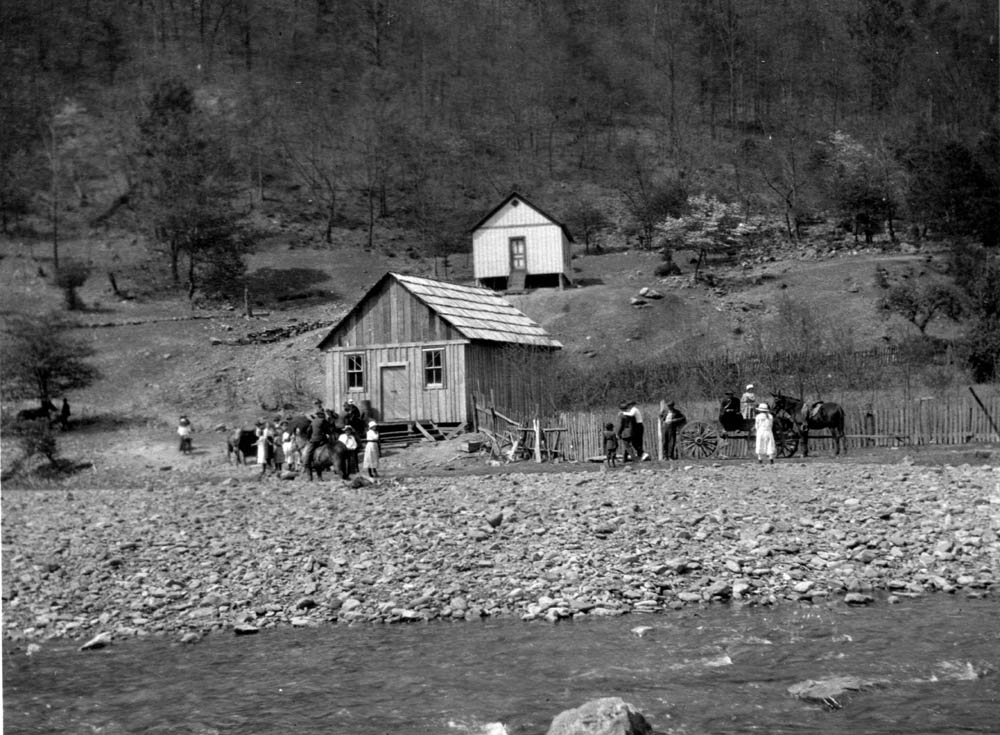
Friends & Neighbors : [Church ?] and school- house next to stream [Greasy Creek].
There are fifty million “schoolhouse in the foothills” stories to be dramatized, published, gobbled and washed down with laughter and tears. The truth is that the situation is too evasive to be captured except in a net of romance or a mire of realism, and every small incident has its share of both. We from the outside come down to the hills. Many of us see the quaint picture of Mag shearing her sheep and spinning the wool, Grannie Hall dipping vegetable dyes and weaving rare patterns in rare colors; hear Lige Jackson sing “Barbry Ellen” to another strange tune, and at the end of a long day fall asleep warmed with romantic ferver. The rest of us must see that forty years of dirt are ground into Mag’s leathery skin, and that Mag and the pig share a filthy kitchen; note that scarcely a house on Greasy possesses an outhouse; know that Grannie’s oldest son and daughter do not belong to her present husband or any other husband; and see Aunt Sary‘s eyes all bloodshot with trachoma.
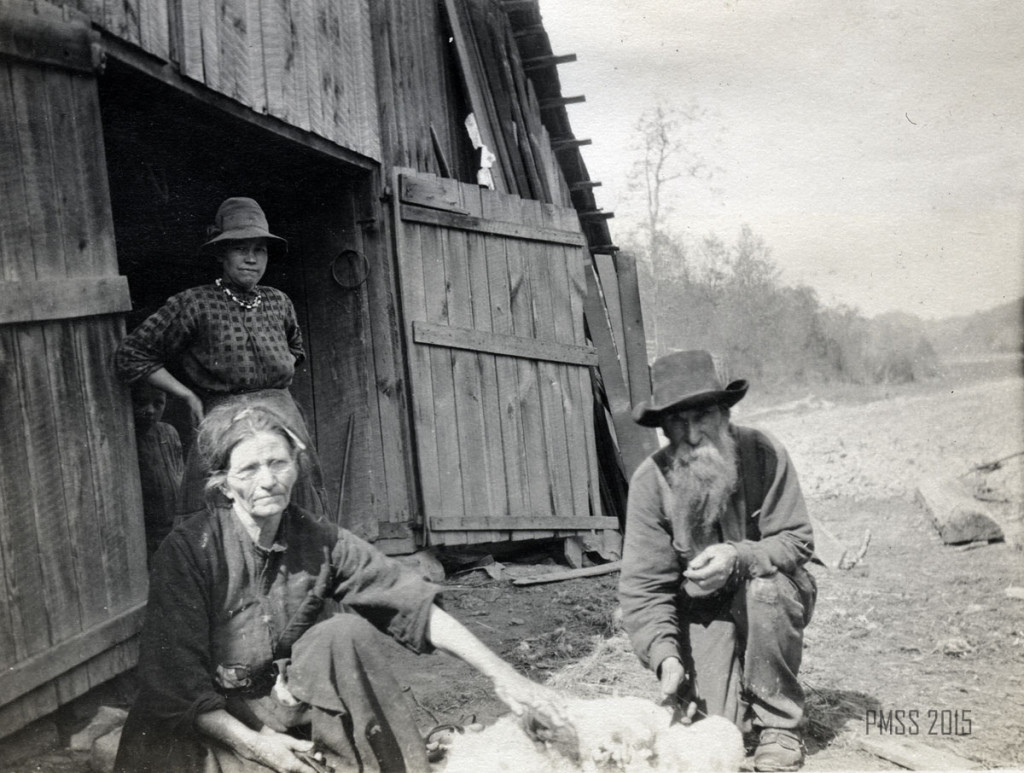
0047b P. Roettinger Album. [Uncle John, Aunt Sis, and Mrs. Joe Day shearing a sheep.] [roe_047b.jpg]
Typical of the homes and families is that of Jap Trotter, whose brood of eight or ten live in two rooms close by the road that runs alongside Greasy. And a typical visit was one I made there with one or two others at Christmas time. It was so five years ago, and doubtless it will be so for two or three years more. After that —
When we were still a hundred feet away from the board fence, the dogs began to bark fiercely, but rather from habit than from any real intent to harm. The cow in the front yard rose with deliberation, clanking the bell tied around its neck. Several chickens flew up squawking. The two pigs eyed us and grunted without interest. Equally…
Page 4 – [cobb_march_time_004.jpg]
4.
…unexcited seemed the family, gathered by this time on the steps to watch us climb the fence. There were Mrs. Trotter, a stout frowsy woman, looking more than middle-aged, and probably thirty-five, two spindling, big-eyed youngsters, evidently girls, although they both wore overalls, a lanky boy of perhaps eleven, with long bony knuckles and wrists thrust inches out of his cotton sleeves (in December), and the oldest boy, about eighteen, a tubercular, scarcely as tall as his eleven-year old brother, and terribly emaciated.
We climbed over a broken step to the small platform that was the porch, and followed the family into the dark windowless room, lighted only with the fire in the fireplace. The walls were papered with newspapers, which cost nothing, and keep out cold. We sat down gingerly on the edge of a chair without a back, and talked for a few moments with Aunt Sary, who is deaf, when she wants to be, and hears wonderfully well when the Civil War is mentioned, or Morgan’s men, who may have marched through this territory. All the flock settled themselves on the floor about us, courteously, but not with enthusiasm, and obviously waiting for the bags of candy which they knew were coming. We were Santa Claus — a thing understood from the beginning. We left soon, followed by the customary “Stay the night” and “Better set awhile,” mountain equivalents of “Come back again sometime.”
This is the family of Will Trotter, who four years ago shot and killed a boy from the outside, and is now a free man, after two years in prison (Kentucky law) — an awful result of liquor and guns, symbols of individual justice in the hills.
I might digress to say here that another evidence of the coming of…
Page 5 – [cobb_march_time_005.jpg]
the outside world here, is the gradual diminishing of the number of “shootings.” There are no longer any real blood feuds. Isolated “killings” occur, such as that mentioned before, and the killing of Little Brit, a young man down the creek, at a drunken brawl about two years ago. Since that time the constant minor quarrels and threats of violence have died away without any awful results. It has been some time now since an afternoon walk down Greasy on Sunday was a matter of life and death. Whether this actually means a more advanced social ethic (doubtful) or a burning out of the lust for blood (as when a disease epidemic somehow dies), one cannot say. Lige Jackson remarked that hit was a weakening of force in the stock. (As a matter of fact intermarriage in families and unwholesome living conditions have taken vast toll of mental and physical hardihood.) It is perhaps improbable that missionary contact has had a greater share than any of these other factors in lessening crime, except as it has always represented a visible arm of the Law, of a sort. There is a wholesome respect for the Law when it is run up against, face to face. Otherwise, Justice still rests between individuals, and crime is of the petty sort, under cover. Unfortunately, a great deal of the mission work, as so often happens, has been carried on in an experimental and unwise way, so that it has defeated its own purpose, and made paupers out of some of the needy who were even in their need a sturdy and self-reliant group. This very thing was remarked to me by a mountain man, native of Harlan. And this fact makes us now more anxious than ever for the effect which the coming of civilization by way of the new road, is going to have on our people. Unfortunately, it will find them considerably weakened, with charity among other things, unless we can…
Page 6 – [cobb_march_time_006.jpg]
…first strengthen them with an injection of self-respect and self-reliance.
[Indigo Blue Pot]
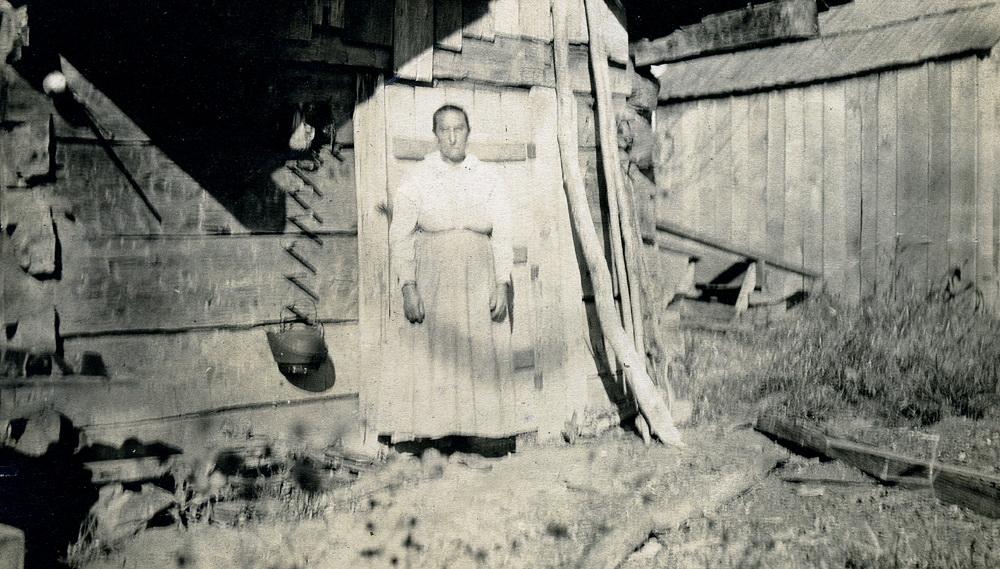
Friends & Neighbors : Woman at cabin doorway, with iron kettle to her right. Vl_34_1091_mod.jpg
In many a backyard here on Greasy the historic blue-pot still boils and smells. The story of the renascence of the crafts in Greasy valley is a part of the romance that lights up some of the sordidness of general living conditions. Originally, of course, the craft arts belonged to the rural people. Our own folk came to this country bringing with them a knowledge of shearing the sheep, carding the wool, spinning it into hanks of yarn, dying it with vegetable juices, threading up the loom and weaving certain patterns, or blanket stripes. They did the weaving then because, like their pioneer forefathers on the coast, they could not buy blankets and material. Aunt Sal’s wedding dress, woven when she was sixteen, was her shroud when she was more than seventy.
But then began occasional trips to town, the exchange of chickens, a pig or a bushel of apples, for commodities. A little later arrived the Sears Roebuck catalogue, and the old tedious art began to die, in favor of twenty-four hour service. And yet it was a pity, for vegetable colors could never be duplicated commercially, and the lovely hues and shades, particularly those of the blue-pot, were a part of a very specialized and difficult branch of art.
Twenty years ago only a few of the oldest women could remember the motions of threading a loom, and these the simplest patterns which they had been taught as little girls. To outsiders coming in, and realizing the worth of this skill in dyeing, the problem was to bring about a natural rebirth of the old craft. One can scarcely recall this happening in the neighborhood about Greasy, without bringing into the history…
Page 7 – [cobb_march_time_007.jpg]
7.
…the splendid leadership of Mrs. Ethel de Long Zande and Miss Katherine Pettit, whose founding of the Pine Mountain Settlement School, with its outpost settlements, was the impulse for the fostering of mountain arts and crafts in this section of the mountains. Today the fireside products bring in a little money to some of the men and women in the community, and this is the only reliable source of income whatsoever. The hours are long, the work is tedious, and the returns are small, and yet when one considers that the hours without such occupation, for the most part, are worth nothing, and life without them is deadly dull, the fireside industry would seem to be a pointing finger to those who are trying to bring new hope to the mountain people.
A visit a few days ago up the road to the Nolan place took me, as a hundred times before, picking my way between mud and debris, up to the combination dining room and kitchen, built, as is somewhat unusual on Greasy, in a long shack apart from the sleeping quarters. A stifling stench, in which stale coffee and burned food predominated, made me draw back involuntarily as I reached the doorway. At four o’clock the remains of the noon meal still lay, with a few dirty dishes, on the table. Soiled clothing, evidently collecting for wash-day, was thrown in a heap in the corner of the room. But on one side was the wood stove, roaring gayly under a great boiler, and on the ground, close to the door, and just outside in the sunshine, stood the famous, precious indigo blue-pot. It smelled very bad, which is the best sign in the world of a successful blue-pot. Mrs. Nolan came around the corner of the house, with the same courtesy and lack of enthusiasm of all the Trotters, cows, pigs and all. Mrs. Nolan is a large woman, with figure bent and misshapen from constant child-…
Page 8 – [cobb_march_time_008.jpg]
8.
…bearing, and face wrinkled with years of care, nose livid from high blood pressure caused by improper food — but a very lovely smile. And she might have been entertaining at Buckingham Palace.
Utter lack of self-consciousness is a part of the seeming indifference, imperviousness to outside events, which sometimes irritates the outsider almost beyond his ability to bear it, and is also the great charm of mountain hospitality. It is the reason we never can speak of our people as unsophisticated, and I would say that the trait, along with more tangible contributions to American culture, is among the Ought-to-be-preserveds.
The occasion for my visit was to inquire about the specific recipe for a blue-pot. She was very willing, but vague. A pinch of this and some of that, and put them all in together, and set the pot. After a while hit begins to smell bad. There were a few other equally vague directions, and with them I had to be content, meanwhile admiring her blue-pot, which was smelling worse every moment. And one must be impressed with the fact that this blue-pot simmering in a back yard is actually a possession of the hills. Here is a frontier where an art as truly American as any we have is being preserved and used by true Americans. In the introduction to his collection of Folk Songs from the Southern Appalachians, Cecil Sharp makes the observation that the great fault with the adjustment of foreigners in our country is their being forced to conform with American culture as they find it, rather than to develop that which is native to them. Thus the mountain people who brought their songs and dances (as well as their crafts) with them into these fastnesses, where there was no different interest to absorb…
Page 9 – [cobb_march_time_009.jpg]
9.
..them, have kept the old culture fairly intact, and unadorned. Hence theirs is a rather pure addition or annex to all that we recognize as “typically American.”
[Kentucky Running Set]
The Kentucky running set is somewhat reminiscent of the old square dances done in most of the rural districts of our country. It is danced in a circle, usually without music, handclapping making the rhythm. As a rule there is one caller, who barks out the figures, which are danced by each couple in turn. When every couple has completed the one figure, the “homeswing” and “Promenade” with partner introduce another.
A “dance” down Greasy, in one of the cabins, is as impossible to describe as it is impossible ever to forget. It begins, always, at dusky-dark, by which time most of the crowd are gathered out in front of the house, and gradually are pushing into the small room. The room is a blue mixture of tobacco smoke and woodsmoke from the open fireplace It is not a large place, of ငourse, but shadowy and lighted only by the firelight or perhaps an oil lamp. The guests enter in small groups without saying much, if anything to the hosts, and gather about in the corners, or line up around the walls, until, a couple at a time, they step out to begin the dance. From that time on, the movement grows faster and faster, the caller’s voice grows louder and more shrill, and the dance goes on far past midnight, without a pause. One notes the complete absence of the usual chit-chat of social gatherings. Odors of tobacco, corn liquor, and perspiration all add to the atmosphere, which helps the clapping hands, the rhythmic movement of the dancers, the shrill bark of the caller, to take a sort of spiritual orgy out of the whirling figures.
Page 10 – [cobb_march_time_010.jpg]
10.
Many of these have probably had their origin in ancient sacrificial dances done in England or European countries. “Bird in the Cage,” in which one man finds himself at the close of the figure in the center of the ring of dancers, doubtless took its beginning from an old dance in which the man in the center actually was killed. Some of the English sword dances of today have a similar origin.
The mountain men and women have a peculiar native poise and grace in dancing that belies the meanest clothing, the untidiest appearance. The dance is done not gayly, but very earnestly, in the real spirit of the rite. In the dimness, and the silence broken only by stamping and clapping, one can almost feel the curtain of antiquity. It is as though he were witnessing a sort of transmigration of that ancient tragedy.
Along with the running-set, which is the mountains’ gem in the crown of American culture, is the preservation of the English “ballet” song here in remote places. There are not so many ballad singers now as a few years ago, but there are a few large families down Greasy where the old ballads are changed from sun to sun, about the house, in the field, and then after dark, by moonlight and firelight. Abner Boggs has a family of eight of the “singingest children that every was,” and Abner himself “has forgot more song ballets as you could put in a washtub”. An afternoon down Greasy is sure to be a bright memory if it includes a singing lesson with Lige, because Lige, along with his powerful voice, which he says folks used to hear from Big Laurel all the way to the mouth of Rockhouse creek, and his amazing quantity and variety of tunes and themes, has also a running stream of entertaining chatter — the true “mother-wit” which we long to keep, along with craft…
Page 11 – [cobb_march_time_011.jpg]
11.
…and songs and dances.
?
of course not every woman can weave, nor can every man give us a new-old ballad. But the craftsmen and singers are there, and cannot be plucked from their setting. For that matter, all the hundreds and thousands of winning ways and winsome words among even the lowliest are bits of art which ought to be immortalized somehow. All this, in spite of that discouraging other side of the picture, makes us loath to sound, back here, the twentieth-century alarm. Yet we know that it must come, even down Greasy, and we of the settlements are bold to feel that ours is in great part the authority which will dictate the manner of its coming.
[Land Use and the Road]
What will become of them, and of us, as we brace ourselves to meet the tide? Many factors will play in our future. A few of these might be mentioned. We have had visions of another cooperative experiment, with a capitalizing of coal facilities. But this is not the real coal region, and the best days for the coal mine have passed. Agriculture is little more than a scratching of rock in vain hope of starting a miraculous flood of bare necessities. Loggers are stripping our forests of their good timber, and leaving the rest unkempt and uncared for for the future. Our people in their blindness and need (and who will blame them? ) eagerly seize the dollar in the hand rather than wait for an uncertain reward in a national park project which may be the solution. Most of them do not own the land they live on, in any case. The few who do own their trees, are glad enough to sell them for a song to lumber companies. And the timber is going rapidly, with a forest preserve becoming less probable.
A recent visitation from federal officials seeking signatures…
Page 12 – [cobb_march_time_012.jpg]
…indicating willingness to be moved from this land to other land outside brought a flurry of anxiety, and a difference of opinion between those owners who wanted to sell, and those who would stay by the land. Bill Creech said brokenly that he’d plowed and harrowed and planted for seventy years now, and raised himself a few apple trees, and had a crop of corn that was fair, and had fit the rocks and won out, and he’d sooner die and be gathered to his fathers than leave what the Lord had given him to test his faith. There was trouble brewing on Greasy. One official received an anonymous note ordering him to “Get out if you know what’s good for you.” And so even a benevolent despotism will not without difficulty move to fresh fields and pasture new the mountain man whose field, however barren, is sacredly his own. Government relief is having a doubtful effect. The mountain man needs, but cannot stand, charity.
In the meantime, the road has come, making an easy means of egress. Moonshining, which during prohibition was checked by natural barriers rather than by law, is now developing in some places to a much more efficient and profitable business — more lucrative than any honest trade. The mountain girl can now get to town more easily, and invariably find herself in the wrong part of town. Prostitution is growing more dangerous to these young women who have no natural standards of conventional morality. The number of illegitimate children which come home to Greasy is pitiable.
We offer again our last solution, the burden of this piece, so romantic as to seem absurd, if we were not defending the cause of a people who have lived romantically — drearily, violently, tragically, yet still romantically, in that, fifteen miles from 1936 they have…
Page 13 – [cobb_march_time_013.jpg]
13.
…remained an aloof and exclusive 1836. There is hope perhaps in opening the gates to the best that can come in, and closing them firmly to the worst as we see it, even if it comes in the name of progress. In the meantime, we would strain every nerve to develop with greater speed than before these tail ends of craft culture, and the whisper of artistic power on this side, while we rush out to cry blatantly our wares on the other side. Perhaps we can find a solution for our people in creating a wider market, taste, and recognition, and then in developing here to meet the[?] market the products of this last frontier.
Back to ALICE COBB GUIDE TO WRITINGS, STORIES & LETTER COPIES
See Also ALICE COBB Biography

